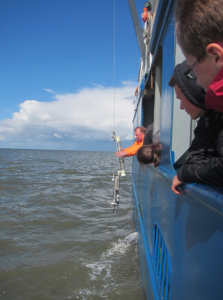
Why care about ocean literacy?
Ocean literacy, the “understanding of the ocean’s influence on you – and your influence on the ocean”, is obviously a topic near and dear to my heart. But a recent paper by Guest, Lotze and Wallace (2015) on “Youth and the sea: Ocean literacy in Nova Scotia, Canada” makes ocean education seem even more important.
In a study of more than 700 students between the age of 12 and 18 in Nova Scotia, Canada, the authors found that those students who reported greater interaction with the ocean also showed more knowledge about the ocean. The authors also found a significant positive correlation between knowledge about the ocean and the value students placed on the ocean, suggesting that in order to raise awareness of the importance of the ocean, a good first step might be to expose students to the ocean more, and then in a second step provide more ocean education.
Interestingly, the authors find that the students have a lot more knowledge about – and interest in – topics related to ocean life than topics related to ocean physics or chemistry. This is maybe not surprising, and seeing that most ocean issues are “sold” using marine life (“Arctic sea ice melting? Poor polar bears!” or “Ocean acidification? What will that do to Nemo-like clown fish who live on reefs?”) this seems to be a good approach. But ultimately the big issues out there are not exclusively related to marine life. And it’s a bit of a hen-and-egg problem: Are they more interested in marine life because it seems to work as a hook and hence they’ve been exposed to it more, or are they exposed to it more because it does work as a hook and hence they are more interested in it?
To contribute to a society that values and protects our ocean, using the pre-existing interest in any kind of oceanography to get students engaged with the ocean as a much larger system seems like a good plan in any case. The authors suggest using more experiential learning methods to expose students to the ocean, and hence raise their interest and knowledge and ultimately the value they place on the ocean. And that is exactly what I am planning to do, for example at Forscherfreizeit Ratzeburg :-)
For inspiration on what YOU could do, check out the European Marine Science Educators’ Association EMSEA’s facebook page. Always great stuff to be found there!
